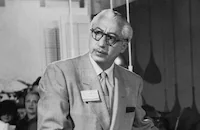Children of Pleasure

Brief Synopsis
Cast & Crew
Harry Beaumont
Lawrence Gray
Wynne Gibson
Helen Johnson
Kenneth Thompson
Lee Kohlmar
Film Details
Technical Specs

Synopsis
Danny Regan, an up-and-coming songwriter, becomes enamored of Pat Thayer, an heiress, but on the night before the wedding, he finds that Pat considers their marriage to be a trial experiment and plans to continue her affair with his understudy. Incensed, he disappears, and later his office coworker, Emma, who has been his constant friend, agrees to marry him. After a drinking spree, Danny awakens, believing that he is married to Emma. He soon discovers that Emma, thinking that he still was in love with Pat, did not go through with the ceremony. Having learned his lesson, he finds that Emma is the girl for him, after all.

Director

Harry Beaumont
Cast

Lawrence Gray

Wynne Gibson
Helen Johnson
Kenneth Thompson
Lee Kohlmar
May Boley

Benny Rubin
Crew
Fred E. Ahlert
David Cox
Fred Fisher
Cedric Gibbons
Percy Hilburn
Howard Johnson
Sammy Lee
Reggie Montgomery
Andy Rice
Richard Schayer
Blanche Sewell
Douglas Shearer
George Todd
Roy Turk
George Ward
Crane Wilbur

Film Details
Technical Specs

Articles
Children of Pleasure -
By Violet LeVoit

Children of Pleasure -
Quotes
Trivia
The play opened in New York on 13 August 1928.













